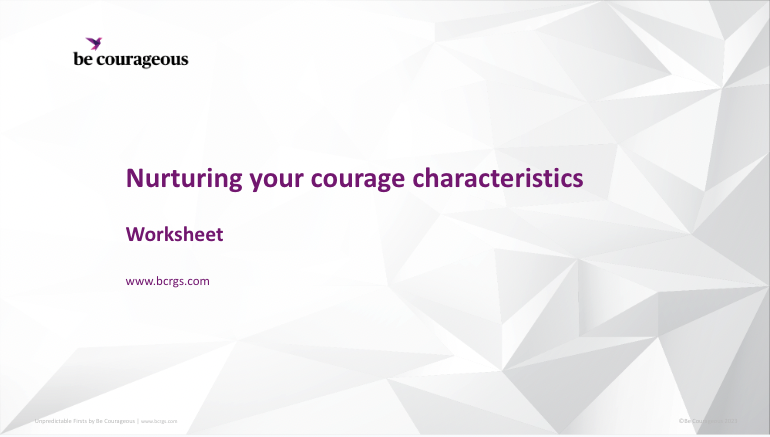Insights – and a twist – from the newest academic study on the psychology on courage in the workplace!
Courage. Everyone wants it, but where does it come from, and how do you get it?
What used to look like courage (fighting off a wild beast threatening your village) in modern times can look like standing up to a toxic boss, making a life-changing decision for your long-term health, or simply sharing an idea close to your heart with others.
We’ve studied courageous people, actions, and behaviors at Be Courageous for over a decade. It’s my mission (and sometimes obsession) that through this company, we can help every person have access to courage anytime they need it.
How I became “The Courage Guy”
I’ve gained expertise in what courage is and how to activate it via:
- Observations and learnings from being a high-performance coach.
- Education by consuming every piece of literature on the topic.
- Over a decade of facilitating and understanding breakthroughs and new innovations with thousands of the world’s most extraordinary leaders that have changed the landscape in every industry (tech, medical, mining, fashion, aeronautics, social media, gaming, you name it).
- Analyzing my own courageous behaviors and what happened in my life growing up in South Africa during apartheid, and beyond, when I made decisions from a place of courage versus a place of fear.
While I’ve seen our unique courage concepts and coaching unlock blockages in companies and people across cultures, to complete my understanding, I wanted the concepts proven here at Be Courageous to be vetted and backed up scientifically and academically.
So, when the opportunity arose to connect with Dr. Glenn Geher and his evolutionary psychology lab at State University at New Paltz (SUNY NP) on one ofthe world’s largest studies on courage in the workplace, I jumped on it.
The Courage Study: Overview
The study unfolded last year, diligently and mindfully, working with Dr. Geher, Shannon Geher, and the brightest graduate and undergraduate students (Sergio, Kaitlyn, Sarai, and Julia), who were also deeply curious about the psychological nature of courage.
Questions were developed to probe into not only Be Courageous models of what defines courage but also how courage maps onto well-studied personality traits.
Over 2,000 people responded to the study, and the results have been presented at multiple academic conferences and has been submitted to academic journals.
How the study worked
Team Courage in the lab at SUNY NP developed two ways of testing:
- Measuring personality traits associated with courage based on past studies–and asking people to rate themselves on those traits. For example, are people who self-identify as resilient more courageous than others?
- Measuring courage in action by presenting several workplace scenarios that tested what a person would actually do in sticky situations that demanded courageous acts.
A person may or may not self-identify with courageous traits, and we wanted to find out how that related (or didn’t relate) to what a person would actually do in an ethical dilemma at work. (For example, anyone with the best intentions to not eat fast food during the day but when driving by In-n-Out Burger finds themselves suddenly inhaling a double-double, fries, and a chocolate shake knows what I mean.)
We all might think or intend to behave one way, but in a specific context or with certain trigger factors (like the smell of those burgers!), perhaps we would behave a completely different way in the moment.
What the courage study found
Now to the exciting part!
The lab discovered that work-related courage is closely associated with these personality attributes:
- Agreeableness (how well one gets along with others)
- Conscientiousness (how diligent one is at work)
- Resilience (how quickly one can bounce back after a failure)
- Extraversion (how outgoing and social someone is)
- Emotional stability (how even-keeled someone is under pressure)
For example:
- A more agreeable person might say “yes” to more people, activities, or projects.
- A conscientious person might stay late to finish a detailed work project on time.
- A resilient person can more easily cope with a disappointment like not getting a promotion.
- An extroverted person may put themselves in more situations that require courage.
- A person who is more emotionally stable could weather the ups and downs of difficult situations.
This makes sense! And we talk about a lot of these (and more) in this Forbes piece about what traits makes up a courageous leader.
The plot twist on courage: Risk-taking and altruism
The study found that people who self-reported as being low in risk-taking tended to be less likely to make courageous decisions when called for, compared to people who identified as risk-takers.
This means that people low on the risk-taking scale were less likely to engage in a courageous action even if they scored high on the other courageous traits.
“People who scored relatively high on risk propensity tended to score relatively high on our ‘Courage in Action’ items.” – Dr. Glenn Geher, from the Psychology Today article, “What Exactly is Courage?”
People can say they’re high in courageous traits all they want, but what predicted courageous and altruistic action most was being a risk-taker. What people were willing to take a risk on and the outcome outweighed the associated fear.
The golden nugget here is that a huge key to unlocking courage is to nurture the risk-taker in you and apply that to an altruistic cause that’s worth the risk.
Altruism and courage
Altruism, the helping of others and one’s broader community seems to connect with the features of courage.
You may not stand up for yourself, but you may stand up for your colleague or family member. Or to put yourself out there for a cause that’s important to humanity, such as SDGs or ESGs. Based on the research, this is likely especially true for the courageous risk-takers among us.
FOR THE FULL COURAGE STUDY REPORT, WHITE PAPER, AND INFOGRAPHIC, CLICK HERE.
Using the courage study’s learnings to unlock your courage
- Identify which courageous personality traits you have in spades versus what you can nurture and grow that relate to courage. (I.e., agreeableness, conscientiousness, resilience, extraversion, and especially risk-taking).
- Think about courageous decisions in your world that need to be made and why it’s worth making that decision.
- Remember that some level of risk will likely be necessary to use your courageous self to make a positive difference in the world.
- Pay particular attention to whether courageous decisions are altruistic and have the capacity to benefit the community at large.
What altruistic, courageous act will you take today?
Courage is not merely a trait; it’s a choice between fear and action toward the greater good.
Altruism serves as a potent catalyst for activating courage within yourself and others. By nurturing your inner courageous hero, embracing risk, and leaning into your inner beliefs and purpose, you become the moonshot capable of transforming your life and the world around you.
Courage isn’t just about personal transformation; it’s about creating a ripple effect of positive change in the lives of those you touch.
As Dr. Geher said, “If it weren’t for courageous risk-takers in our past, we might not even be here at all right now. Think about that.”
So, ask yourself, “What courageous act will I undertake today?”
FOR MORE INSIGHTS, A LEADERSHIP ACTION PLAN, AND HOW TO OVERCOME COMMON CHALLENGES, CLICK HERE.
Courage Characteristics Tool
Identify where and how to develop the characteristics of courage in yourself, based on the latest scientific study on courage.
Need help learning how to become a more courageous risk-taker and what’s worth taking risks on in a healthy, sustainable way? Reach out!
Co-writers: Shannon Geher, Glenn Geher


